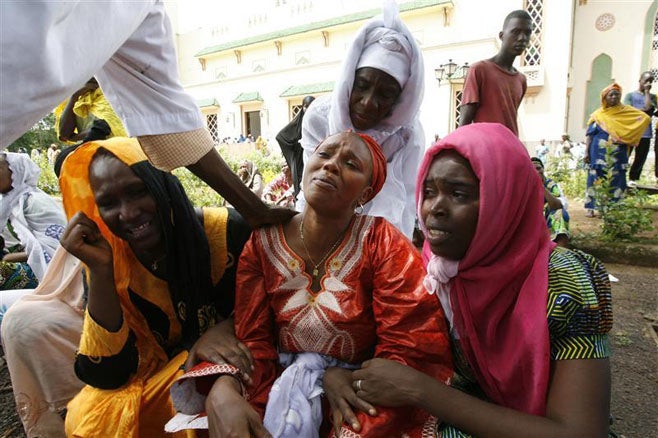By Polly Johnson
Impunity Watch Reporter, Africa

CONAKRY, Guinea – Families of the victims of the September 28, 2009 massacre in Conakry, in which junta troops murdered, raped, and tortured protesters at a political rally at Conakry’s biggest stadium, leaving one hundred and fifty seven dead, were unable to gather at the stadium to mark the one-year anniversary.
One year ago, thousands of peaceful protestors gathered at the Conakry stadium to protest the continued military rule of then-leader Captain Moussa Dadis Camara. Unable to suppress the rally, armed guards, anti-riot police, and militia in civilian clothes sealed the exits and opened fire on the protestors in the packed stadium. In addition to the murders, hundreds of women were raped at the stadium and others were detained for rape later. Protesters were illegally arrested and brutally tortured. In an attempt to hide the evidence, armed forces buried the bodies in mass graves.
Both the United Nations and the International Criminal Court deemed the crimes that occurred during the massacre as crimes against humanity.
The massacre stemmed from Guinea’s political structure. The army, which had at that time grown to a body of over thirty thousand men, ruled the country. In 2008, army captain Camara seized power and became leader of the military regime known as the Conseil National pour la Democratie et le Development (CNDD), which planned the attack in advance, according to HRW.
Camara was wounded in an assassination attempt last December and has been incapacitated since. General Sekouba Konate has been leading the transition until the election of a civilian president
Current presidential candidate Cellou Dalein Diallo said that if he were elected president, he would consider putting in place a Truth and Reconciliation Commission, “not necessarily to punish people but to condemn the really barbaric acts that were committed and which should be completely banned from our armed forces and the police.” Diallo was badly beaten himself in the massacre and treated for broken ribs.
The country has made important strides in the past year. The military is less visible. There are hopes that the October elections will bring democratic rule to the country.
But the perpetrators of the massacre are still free, and, according to HRW, the only way to break the cycle of impunity in Guinea is to bring the perpetrators to justice.
“While the mothers, fathers, spouses, and children of those murdered one year ago still grieve for their loved ones, the people who planned, perpetrated, and tried to cover up this atrocious act remain free men,” said senior West Africa researcher at HRW Corinne Dufka.
“The new government should waste no time in tackling the vicious cycle of violence and impunity that created the conditions for massacres like the one last year,” Dufka said. “Strengthening the judiciary and ensuring that those responsible for the 2009 violence are behind bars is a very good place to start.”
For more information, please see:
AFP – Guinea presidential hopeful seeks massacre truth commission – 28 September 2010
AFP – A year after Guinea massacre, culprits still free – 27 September 2010
Associated Press – Guinea massacre victims’ families unable to gather – 28 September 2010
BBC – Did Guinea democracy activists give their lives in vain? – 27 September 2010
Bloomberg – Guinea Failing to Prosecute Massacre Perpetrators, Human Rights Watch Says – 27 September 2010
Human Rights Watch – Guinea: One Year On, No Justice for Bloody Stadium Massacre – 27 September 2010


